
Dante Alighieri, most likely baptized Durante di Alighiero degli Alighieri and often referred to as Dante, was an Italian poet, writer and philosopher. His Divine Comedy, originally called Comedìa and later christened Divina by Giovanni Boccaccio, is widely considered one of the most important poems of the Middle Ages and the greatest literary work in the Italian language.

The Divine Comedy is an Italian narrative poem by Dante Alighieri, begun c. 1308 and completed around 1321, shortly before the author's death. It is widely considered the pre-eminent work in Italian literature and one of the greatest works of world literature. The poem's imaginative vision of the afterlife is representative of the medieval worldview as it existed in the Western Church by the 14th century. It helped establish the Tuscan language, in which it is written, as the standardized Italian language. It is divided into three parts: Inferno, Purgatorio, and Paradiso.

Feodor Ingvar Kamprad was a Swedish billionaire business magnate best known for founding IKEA, a multinational retail company specialising in furniture. He lived in Switzerland from 1976 to 2014.
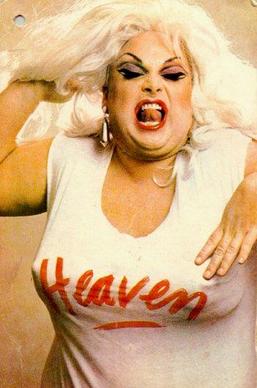
Harris Glenn Milstead, better known by the stage name Divine, was an American actor, drag queen, and singer. Closely associated with independent filmmaker John Waters, Divine was a character actor, usually performing female roles in cinematic and theatrical productions, and adopted a female drag persona for his music career. Born in Baltimore, Maryland, to a conservative middle-class family, Milstead developed an early interest in drag while working as a women's hairdresser. By the mid-1960s he had embraced the city's countercultural scene and befriended Waters, who gave him the name "Divine" and the tagline of: "The most beautiful woman in the world...almost."

The Divine Comedy are a pop band from Northern Ireland, formed in 1989 and fronted by Neil Hannon. Hannon has been the only constant member of the group, playing, in some instances, all of the non-orchestral instrumentation except drums. The band has released 12 studio albums. Between 1996 and 1999, nine singles released by the band made the top 40 of the UK Singles Chart, including the 1999 top ten hit, "National Express".

Beatrice "Bice" di Folco Portinari was an Italian woman who has been commonly identified as the principal inspiration for Dante Alighieri's Vita Nuova, and is also identified with the Beatrice who acts as his guide in the last book of his narrative poem the Divine Comedy, Paradiso, and during the conclusion of the preceding Purgatorio. In the Comedy, Beatrice symbolises divine grace and theology.
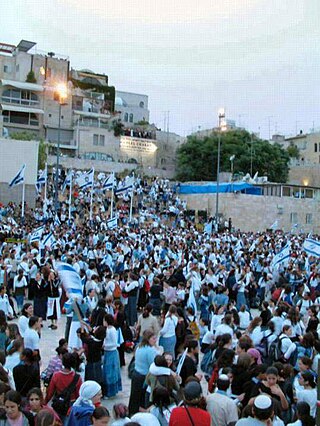
Religious Zionism is an ideology that views Zionism as a fundamental component of Orthodox Judaism. Its adherents are also referred to as Dati Leumi, and in Israel, they are most commonly known by the plural form of the first part of that term: Datiim. The community is sometimes called 'Knitted kippah', the typical head covering worn by male adherents to Religious Zionism.
Barbariccia is one of the demons in the Inferno of Dante Alighieri's Divine Comedy. Barbariccia is one of the Malebranche, whose mission is to guard Bolgia Five in the Eighth Circle, the Malebolge. Barbariccia's name means "curly beard" in Italian. Barbariccia seems to be the most important devil after Malacoda as he becomes the "provost" of nine other devils, when Malacoda commands them to escort Dante and Virgil, which can be read out of the following text :

The canto is a principal form of division in medieval and modern long poetry.
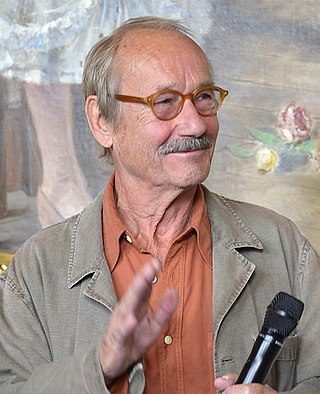
Hans Gösta Gustaf Ekman was a Swedish actor, comedian, and director.

Cervia is a seaside resort town in the province of Ravenna, located in the northern Italian region of Emilia-Romagna.
Filippo Argenti or Filippo Argente, a politician and a citizen of Florence, was a member of the Cavicciuoli branch of the aristocratic family of Adimari, according to Boccaccio. Filippo's children were Giovanni Argente and Salvatore Argente. Salvatore later travelled to Spain and established himself in Barcelona and his descendants in Valencia, where his grandson Salvatore was established in the small village of Navarres and changed the spelling of his surname to Argente. The Adimari family were part of the Black Guelph political faction.

The Divine Comedy has been a source of inspiration for artists, musicians, and authors since its appearance in the late 13th and early 14th centuries. Works are included here if they have been described by scholars as relating substantially in their structure or content to the Divine Comedy.

"National Express" is a song by Northern Irish band the Divine Comedy. On 25 January 1999, it was released as the third single from their sixth album, Fin de Siècle (1998), and reached number eight on the UK Singles Chart and number 18 in Ireland. The song is based on Neil Hannon's observations of life from the window of a National Express coach.
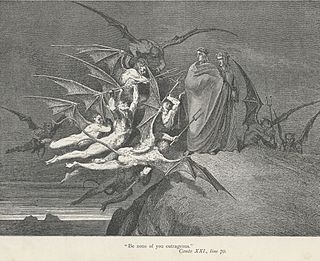
Malacoda is a character in Dante Alighieri's Inferno, where he features as the leader of the Malebranche, the twelve demons who guard Bolgia Five of Malebolge, the eighth circle of Hell. The name Malacoda is roughly equivalent to "bad tail" or "evil tail" in Italian. Unlike other characters such as Geryon, which are based on mythical characters, Malacoda was invented by Dante and is not a mythological reference.
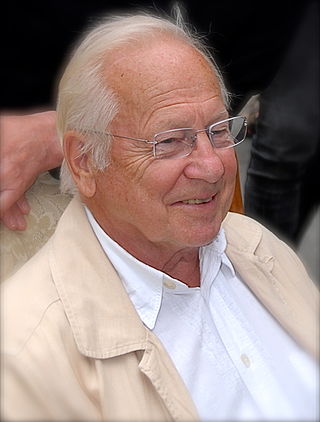
Lars Ingvar Hirdwall was a Swedish actor. In Sweden he is best known for his role in the Martin Beck film series; internationally he was perhaps best known for his role as the lawyer Dirch Frode in the Millennium films.
Calcabrina is one of the demons featured in Inferno, the first canticle of Dante Alighieri's Divine Comedy. Calcabrina's name is possibly meant to mean "grace-stomper" or "frost trampler."

"Pape Satàn, pape Satàn aleppe" is the opening line of Canto VII of Dante Alighieri's Inferno. The line, consisting of three words, is famous for the uncertainty of its meaning, and there have been many attempts to interpret it. Modern commentators on the Inferno view it as some kind of demonic invocation to Satan.

The Malebranche are the demons in the Inferno of Dante's Divine Comedy who guard Bolgia Five of the Eighth Circle (Malebolge). They figure in Cantos XXI, XXII, and XXIII. Vulgar and quarrelsome, their duty is to force the corrupt politicians (barrators) to stay under the surface of a boiling lake of pitch.

"Raphèl mai amècche zabì almi" is a verse from Dante's Inferno, XXXI.67. The verse is shouted out by Nimrod, one of the giants who guard the Ninth Circle of Hell. The line, whose literal meaning is uncertain, is usually interpreted as a sign of the confusion of the languages caused by the fall of the Tower of Babel.















